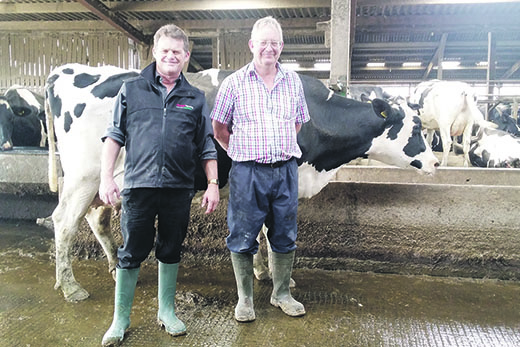David Law with United Kingdom farmer James Rogerson and one of his very large Friesian cows, which produces 12,000 litres of milk. One of the seminars David addressed in February was held on the Rogerson farm. David Law didn’t plan to be an effluent consultant when he gave up farming in 2012. He instead set out to be fertiliser rep, visiting farmers, forming relationships and passing on what he’d learned from running his own farm on biological principles. “One of my clients came across Slurry Bugs developed by Envirosystems in the United Kingdom to treat effluent ponds and when he made contact to order some, he was told the company was looking for an agent in New Zealand. “The farmer told them to give me a call – I’d be their agent – well that was the first I knew about it.” However, when Sally Russell of Envirosystems contacted him, David was intrigued by the concept that a bacteria and enzyme cocktail, not machinery, could break down the crust on effluent ponds. “So after finding out more, I agreed to be the New Zealand agent. Slurry Bugs are a great product. If you correct effluent pH and follow the instructions exactly, you will see the crust gradually disappear,” says David. “After a few weeks, you end up with 100 per cent liquid that is easy to spread with little odour. “When they first see this, farmers can’t believe where the solids have gone. “The answer is that they’ve been digested by the effluent bugs and converted into aerobic bacterial organic matter, suspended in the liquid. On the surface, it looks like pond water. “That bacterial matter is nectar to soil organisms. It promotes oxygenation of the soil and, as it breaks down, releases a rich supply of nutrients that feed soil organisms and plants alike.” However, the bugs didn’t work for all farmers. “Often because, despite what we tell them, they continue to put chlorine used to clean the dairy sheds into the ponds, which inhibits the action of the beneficial bugs.” New formula Realising it was hard to change farming habits, David and his associates formed a company called TDR NZ Ltd, and set about formulating a stable form of chlorine suitable for cleaning, which wouldn’t kill the bugs. “This product, which we have called DX50, can be mixed and will stay stable for up to 12 months as opposed to just a few hours for similar products. We are awaiting Ministry for Primary Industries approval for its use.” Through his work with effluent ponds, David also began investigating why the crusting was happening. “It wasn’t long before I could look at a pond and tell a farmer which fertiliser company supplied his fertiliser and what the farm’s soil pH was.” David also realised that while Slurry Bugs are very effective in treating ponds, they are not the whole answer farmers need. “Contrary to popular opinion, a crust is not inevitable, but it does tell you there is something wrong.” Interconnected parts Further research has led David to develop a concept he calls ‘BioCircle’ which looks at a dairy system as four interconnected parts – soil, grass, cows and effluent. “Fundamentally, this begins and ends with the soil and the ways in which it affects grass quality. “Whether grazed or conserved, this impacts the cows, then effluent impacts soil biology, either for good or ill.” Intrigued by what he’s doing, Sally Russell of Envirosystems invited David to the UK in February to talk at a series of seminar to farmers and scientists. As a result of this visit, Envirosystems is franchising David’s BioCircle concept and promoting it through the UK and Europe. “It’s not at all the life I was planning when I gave up farming – but it’s fascinating,” says David, who takes satisfaction in helping farmers achieve better results for their bottom-line and the environment.



0 Comments
Leave a Comment